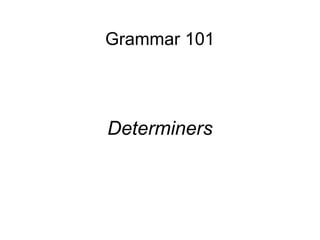
LL Lower Primary A - Determiners
- 2. Introduction Determiners determine or show. There, you have it. You can usually tell what are the functions of grammar items from their names. In this case, determiners show the nature of nouns.
- 3. Articles and Quantifiers There are two types of determiners being discussed here: Articles and Quantifiers. The first type, articles, is simple enough as there are only three of them. They are: a , an & the
- 4. Articles ● We use 'the' when the subject or noun has been previously referred in a text already. For e.g., “Mother always scolds me for leaving things around the house. The thing that I always leave around is my mug.” ● Otherwise, 'a' and 'an' are used. “Mother always scolds me for leaving things around the house. She warns me that a punishment (or an angry mother) should be expected soon.” ● 'an' is used when the noun starts with a vowel.
- 5. Quantifiers ● We use these to express quantity. ● Refer to your Learning Guide for a list of quantifiers commonly used. ● Of special note is a Quantifier that refers to both singular and plural nouns – 'any'. 1) I don't have any favours to give. 2) I don't have any money to give. ● Some common quantifiers are: Each, every, much refer to singular nouns. All, a lot of, many, most refer to plural ones.
- 6. Learning Activity ● Complete the blanks with suitable quantifiers. 1) “Do we have ______ rice left?” asked the poor widow. 2) “No, mother, what ______ we have, we gave to the stranger.” replied her son. 3) The stranger, upon hearing this, said, “I'll fill your urns with _______ oil and rice, they will never be used up.” 4) “O, thank you!” came a unified reply.
- 7. Learning Activity Answers ● “Do we have any rice left?” asked the poor widow. ● “No, mother, what little we have, we gave to the stranger.” replied her son. ● The stranger, upon hearing this, said, “I'll fill your urns with much oil and rice, they will never be used up.” ● “O, thank you!” came a unified reply.
- 8. Discussion ● What are determiners called as such? ● A Quantifier is a type of determiners. What do they do?
- 9. In Summary ● Determiners show the nature of nouns. ● Quantifiers show quantity – whether the nouns are many (plural) or individual units (singular).
- 10. In Summary ● Determiners show the nature of nouns. ● Quantifiers show quantity – whether the nouns are many (plural) or individual units (singular).
